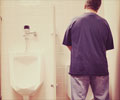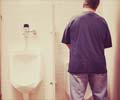Danish medical doctors have come up with a finding that nighttime urine of children who do not respond to desmopressin, a common medication, show more sodium and urea

Some children take longer to develop this rhythm, which is why about 15% of enuretic children will spontaneously stop bedwetting each year without any intervention or treatment. The condition affects 7-10 percent of 7-year-old children, but some severe cases linger much longer. Approximately, 2 percent of young adults have the problem, which may persist for life.
Rittig published a study in 1989 showing that the hormone vasopressin plays a role in enuresis. This research led to the use of desmopressin in controlling bedwetting in many enuretic children. Although 70% of children who suffer from bedwetting (nocturnal enuresis) respond to desmopressin, 30% do not. This puzzled Dr.Rittig and others.
So, a study was conducted by Danish medical doctors, Konstantinos Kamperis and Jens Christian Djurhuus of the University of Aarhus, Aarhus, Denmark and Soren Rittig and Kaj Anker Jorgensen of the Aarhus University Hospital, in a bid to solve this puzzle. Their study 'Nocturnal polyuria in monosymptomatic nocturnal enuresis refractory to desmopressin treatment,' reveals that nighttime urine of bed wetting children who do not respond to the common medication, has more sodium and urea. They say that this may possibly be due to an imbalance of prostaglandin, which is a hormone-like substance. The study appears in the December issue of the American Journal of Physiology-Renal Physiology published by the American Physiological Society. The doctors, who treat enuresis, hope that this finding could help lead to better treatment for these children.
The researchers carried out a 24-hour study to understand the physiological mechanisms behind the 30% of desmopressin non-responders. They examined 46 enuretic children, ages 7-14, who were outpatients at the Center for Child Incontinence at Aarhus University Hospital and whose enuresis had failed to respond to desmopressin. The enuretic children were divided into a 'polyuric' group (average nocturnal output on wet nights exceeded 130% of expected bladder capacity) and a non-polyuric group (output on wet nights less than 130% of expected capacity). The study also included an age-matched control group of 15 non-enuretic children.
The children spent two nights at Aarhus University Hospital. The first night was to acclimate the children to the hospital environment while the second night was the experimental period. The researchers collected blood and urine from the children during the second night, without waking them. This gave the researchers a more complete picture of physiological changes that occur through the course of an entire night.
Advertisement
During the night, polyuric children excreted twice as much urine compared to the non-polyuric children and the controls. The researchers found that the urine of the polyuric children who wet their beds during the experiment contained more:
Advertisement
• Urea
• Prostaglandin
Interestingly, the children who wet the bed did not excrete a greater volume of water: It was the sodium and urea content that made the difference. Sodium and urea excretion was much higher among children who wet the bed, and these substances expand the volume of urine in the bladder, leading to enuresis.
The study also looked at a variety of other factors that could play a role in bedwetting, including mean arterial pressure, heart rate, atrial natriuretic peptide, angiotensin II, aldosterone and renin levels, but found no differences among the groups. In addition, there was no difference for vasopressin between the two enuretic groups.
Some enuretic children (five polyurics and four nonpolyurics) did not have a wet night during their stay. This is not unusual for enuretic children, many of who get through some nights without an episode. The enuretic children who were dry provided one more opportunity to find the physiological difference between them on dry and wet nights, Kamperis said. Commenting on the finding that urine from enuretic episodes in the first hours of sleep is quite different from the urine the researchers collected in the morning, Kamperis stated that, 'The first hours are most important.'
While the study suggests that sodium is the main culprit among this subpopulation of enuretic children, there is much still to be done to understand how the process works.
The increased prostaglandin production of the polyurics could account for the difference in excretion of sodium, the authors noted. Prostaglandins counteract the actions of vasopressin and influence the amount of sodium we excrete.
The researchers have proceeded to the next step: Treatment Trial. They are treating children who do not respond to desmopressin, with indomethacin, a prostaglandin inhibitor. Rittig expects these trials, which include a placebo, to be complete within a year.
Source-Eurekalert
SRM/S











